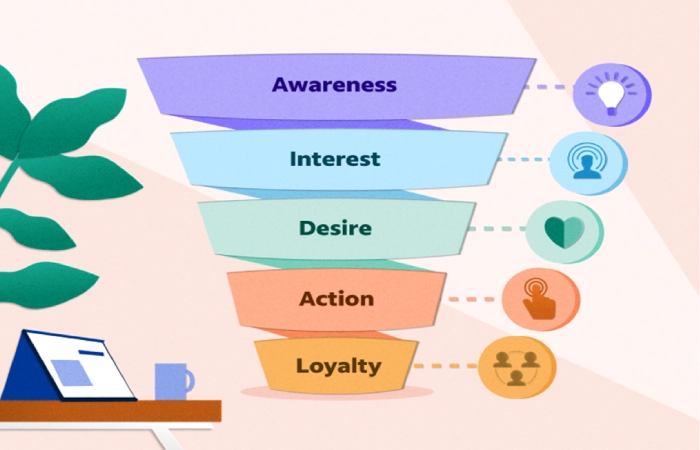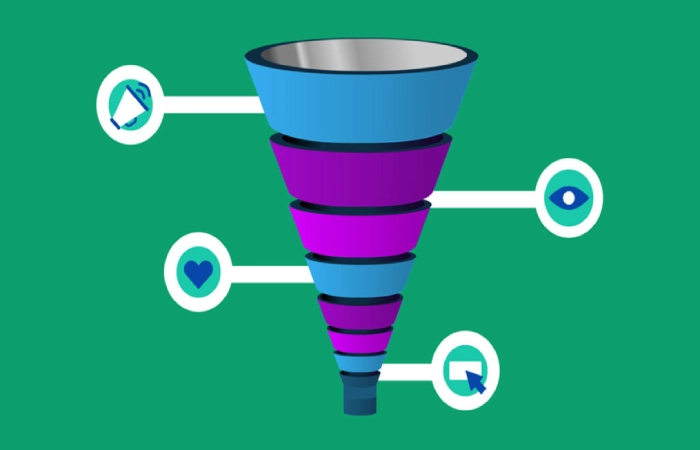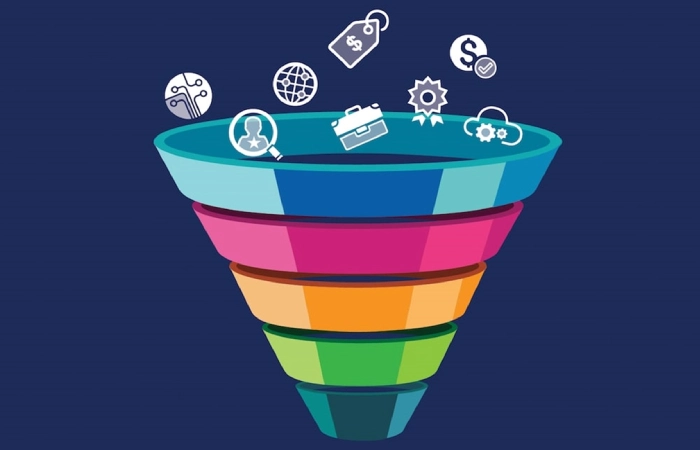When it comes to business, where conversions and revenue streams are often used to measure success, the idea of a sales funnel stands out as a way to direct people from being prospects to loyal customers. Envision a funnel with a broad opening at the top and a narrowing at the bottom; this represents the path that potential customers take from first being aware of your brand to making a purchase.
Here, you can learn how a sales funnel can help your company thrive by delving into its essential function and the ways it can drive growth, strengthen relationships with customers, and achieve long-term success.
Now that we know what a sales funnel is, let’s break it down and see how it works. A sales funnel is essentially a customer journey map, outlining the steps potential customers must take from learning about your product or service to committing to a purchase.
The metaphor of a funnel properly describes this journey, with each stage representing a narrowing of the pool of prospects as they move closer to making a purchase. Discover more important info here at https://www.marketingweek.com/.
The widest part of the funnel is at the very top, where prospects join the awareness stage. Here, they learn about your company, product, or service through different types of marketing, like ads, social media, or content marketing. As a prospect moves through the funnel, they go through stages of consideration, evaluation, and finally conversion.
Table of Contents
How to Use a Sales Funnel to Your Advantage?

Now that we’ve covered the basics, let’s talk about the many reasons why using a sales funnel in your business is a good idea.
From enhancing lead generation to nurturing customer relationships, a well-designed sales funnel serves as a strategic blueprint for success. Here are the benefits we want you to know:
Enhanced Lead Generation

At the top of the funnel, lead generation reigns supreme. By casting a wide net and attracting prospects through targeted marketing campaigns, content creation, and lead magnets, a sales funnel amplifies your ability to capture potential customers’ attention.
Whether it’s through captivating social media posts, informative blog articles, or enticing email opt-ins, the funnel serves as a magnet, drawing prospects into the orbit of your brand.
Qualification and Segmentation of Leads
As prospects journey through the funnel, they undergo a process of qualification and segmentation—a crucial step in optimizing resources and focusing efforts on high-potential leads. Through strategic lead scoring mechanisms, behavioral tracking, and engagement analytics, the funnel enables you to identify and prioritize leads based on their level of interest, engagement, and propensity to convert.
This segmentation empowers you to tailor your messaging and offers to resonate with each segment’s specific needs and preferences.
Nurturing Customer Relationships

Beyond mere lead generation, a sales funnel serves as a nurturing ground for building meaningful customer relationships. As prospects progress through the funnel, they are greeted with personalized content, targeted offers, and strategic touchpoints designed to engage, educate, and cultivate trust.
Whether it’s through automated email sequences, personalized follow-ups, or interactive webinars, the funnel fosters a sense of connection and rapport, laying the foundation for long-term customer loyalty.
Streamlined Conversion Process
At the heart of the sales funnel lies the conversion process—an orchestrated sequence of steps designed to guide prospects towards making a purchase decision. By streamlining the conversion process and removing friction points, such as cumbersome checkout processes or ambiguous calls to action, the funnel optimizes the path to conversion, making it easier and more intuitive for prospects to take the desired action.
This streamlined approach enhances the overall customer experience, increasing the likelihood of conversion and reducing abandonment rates.
Data-Driven Decision Making

A sales funnel is not merely a conceptual framework; it’s a data-driven powerhouse that provides valuable insights into customer behavior, preferences, and engagement patterns. Through robust analytics and tracking mechanisms, the funnel enables you to gain a deeper understanding of your audience, identify trends, and uncover opportunities for optimization.
Whether it’s analyzing conversion rates, tracking funnel drop-off points, or A/B testing different elements of your funnel, the data-driven approach empowers you to make informed decisions and continuously refine your strategy for maximum impact.
Optimization and Scalability
Continuous optimization is the heartbeat of a successful sales funnel. By monitoring key performance metrics, conducting experiments, and iterating on your strategy based on data-driven insights, you can fine-tune your funnel for optimal performance and scalability.
Whether it’s tweaking email subject lines for higher open rates, optimizing landing pages for improved conversion rates, or experimenting with different lead magnets to attract more qualified leads, the funnel allows for iterative improvement, driving sustainable growth and scalability.
Increased Revenue and ROI
Ultimately, the main point of a sales funnel is to drive revenue and deliver a positive return on investment (ROI) for your marketing efforts.
By guiding prospects through a structured journey of engagement and conversion, the funnel maximizes your ability to turn leads into paying customers and, ultimately, advocates for your brand. Whether it’s through upsells, cross-sells, or repeat purchases, a well-designed funnel contributes to increased revenue generation and a higher ROI on your marketing investments.
Adaptability to Customer Journey
When we’re talking about the dynamic marketplace, where customer preferences and behaviors are constantly evolving, adaptability is key. A sales funnel offers the flexibility to adapt to changes in the customer journey, emerging trends, and market dynamics.
Whether it’s incorporating new channels, experimenting with different messaging strategies, or adjusting your funnel based on customer feedback, the adaptable nature of the funnel ensures that your strategy remains agile and responsive to the evolving needs of your audience.
Targeted Marketing Campaigns
A well-structured sales funnel allows for the creation of highly targeted marketing campaigns tailored to specific segments of your audience.
By understanding where prospects are in the funnel and their unique needs and preferences, you can craft messaging and offers that resonate with their interests. This targeted approach not only increases the relevance of your marketing efforts but also enhances engagement and conversion rates.
Keeping and Gaining Customers
Getting new customers is important for growth, but keeping the ones you already have is just as important for long-term success. A sales funnel software enables you to implement strategies for customer retention and loyalty by nurturing relationships beyond the initial purchase.
Through personalized follow-ups, loyalty programs, and ongoing communication, you can keep customers engaged, satisfied, and loyal to your brand, ultimately driving repeat business and advocacy.
Alignment of Sales and Marketing Efforts
In many organizations, sales and marketing teams operate in silos, leading to disjointed efforts and missed opportunities. A sales funnel serves as a bridge between sales and marketing, aligning their efforts towards a common goal—driving revenue and customer acquisition.
By providing visibility into the customer journey and facilitating seamless communication between teams, the funnel fosters collaboration, synergy, and a shared understanding of objectives, ultimately leading to more effective and coordinated efforts.
Opportunity for Upselling and Cross-Selling
A sales funnel presents opportunities for upselling and cross-selling additional products or services to existing customers. As prospects progress through the funnel and become customers, you can leverage their existing relationship with your brand to introduce complementary offerings or upgraded versions of their initial purchase.
This strategic approach not only increases the lifetime value of customers but also enhances their overall experience by providing additional value and convenience.
Be Better than Your Competitors
And lastly, folks, you should know that a well-designed sales funnel can give you a leg up in today’s competitive market, where companies fight for customers’ attention and loyalty. A well-organized sales funnel does double duty: it improves the customer experience and establishes your company as an industry leader. You can set yourself apart from competitors and create a memorable, engaging experience that makes you stand out in the market by providing personalized, targeted interactions at every touchpoint.
